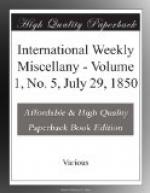We take leave of the work, with a few more characteristic passages.
* * * * *
A Glimpse of Pitt and fox.—Some years later, I saw Mr. Pitt in a blue coat, buckskin breeches and boots, and a round hat, with powder and pigtail. He was thin and gaunt, with his hat off his forehead, and his nose in the air. Much about the same time I saw his friend, the first Lord Liverpool, a respectable looking old gentleman, in a brown wig. Later still, I saw Mr. Fox, fat and jovial, though he was then declining. He, who had been a “bean” in his youth, then looked something quaker-like as to dress, with plain colored clothes, a broad round hat, white waistcoat, and, if I am not mistaken, white stockings. He was standing in Parliament street, just where the street commences as you leave Whitehall; and was making two young gentlemen laugh heartily at something which he seemed to be relating.
* * * * *
Cooke’s edition of the British poets.—In those times, Cooke’s edition of the British Poets came up. I had got an odd volume of Spenser; and I fell passionately in love with Collins and Gray. How I loved those little sixpenny numbers, containing whole poets! I doated on their size; I doated on their type, on their ornaments, on their wrappers containing lists of other poets, and on the engraving from Kirk. I bought them over and over again, and used to get up select sets, which disappeared like buttered crumpets; for I could resist neither giving them away nor possessing them. When the master tormented me, when I used to hate and loathe the sight of Homer, and Demosthenes, and Cicero, I would comfort myself with thinking of the sixpence in my pocket, with which I should go out to Paternoster Row, when school was over, and buy another number of an English poet.
* * * * *
Children’s books: “Sandford and Merton.”—The children’s books in those days were Hogarth’s pictures taken in their most literal acceptation. Every good boy was to ride in his coach, and be a lord mayor; and every bad boy was to be hung, or eaten by lions. The gingerbread was gilt, and the books were gilt like the gingerbread: a “take in” the more gross, inasmuch as nothing could be plainer or less dazzling than the books of the same boys when they grew a little older. There was a lingering old ballad or so in favor of the gallanter apprentices who tore out lions’ hearts and astonished gazing sultans; and in antiquarian corners, Percy’s “Reliques” were preparing a nobler age, both in poetry and prose. But the first counteraction came, as it ought, in the shape of a new book for children. The pool of mercenary and time-serving ethics was first blown over by the fresh country breeze of Mr. Day’s “Sandford and Merton,” a production that I well remember, and shall ever be grateful for.




